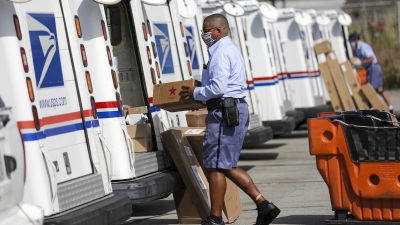
Photo by Charles Williams / flickr CC 2.0)
As the pandemic rages throughout the country, voting by mail has become a particularly appealing option. But a big turnout is Donald Trump’s electoral enemy, so his administration has launched an attack on the US Postal Service — making it a central player in the preservation of American democracy.
Trump Installs Loyalists and Threatens Funding
Aug 20, 2019: With the confirmation of Ron Bloom, four of the seven members of the US Postal Service Board of Governors are now Trump appointees. The chairman is Robert Duncan, whose official biography on the USPS website boasts that from 2007 to 2009, he was chairman of the Republican National Committee, where he “raised an unprecedented $428 million and grew the donor base to 1.8 million – more donors than at any time in RNC history.”
Oct. 16, 2019: Postmaster General Megan Brennan, one of three remaining non-Trump board members, retires effective Jan. 31, 2020. She later agreed to remain until a replacement is found.
March 2020: The Postal Service projects that to maintain nationwide delivery of essential mail and parcels, including prescriptions, food and household necessities, its operations will lose $2 billion per month through the coronavirus recession.
Also in March: Trump threatens to veto the first bipartisan coronavirus relief package because it includes a $13 billion grant to keep the Postal Service on firm financial footing. Treasury Secretary Steven Mnuchin warns legislators that the USPS provision will blow up the entire bill. Over his objections, the final legislation includes on a $10 billion loan, without which the USPS will become “financially illiquid” by Sept. 30, 2020. But the terms of that loan are subject to Mnuchin’s approval and, in subsequent negotiations with the Postal Service, he seeks terms that will pull the agency into the White House’s sphere of influence.
April 30: Less than a week before the Board of Governors announces the appointment of a highly partisan postmaster general, another non-Trump board member and former inspector general of the Postal Service, David C. Williams, resigns as vice-chairman of the board.
May 6: The Board of Governors announces that Louis DeJoy will become the new postmaster general, starting June 15. According to Federal Election Commission records, DeJoy has contributed more than $1.2 million to the Trump Victory Fund and millions more to Republican Party organizations and candidates. He also chairs the finance committee for the 2020 Republican National Convention.
May 15: Deputy Postmaster General Ron Stroman, the last of the non-Trump appointees on the Board of Governors, resigns effective June 1. According to later reporting by The Washington Post, both Williams and Stroman have resigned over Mnuchin’s involvement with the Postal Service, including efforts to influence the appointment of the new postmaster general.
July 13: DeJoy announces major operational changes that will lead to slower and less reliable mail delivery.
July 29: The Treasury Department and the Postal Service agree to terms whereby the Postal Service will receive the $10 billion loan that Congress had appropriated four months earlier.
Trump and His Loyalists Intensify the Attack
Aug. 4: Asserting that Florida’s mail-in voting system works but that Nevada’s newly enacted law requiring all voters to receive mail-in ballots will be fraught with problems, Trump says, “Florida has got a great Republican governor…” Then he adds, “I mean, in Nevada, where you have a governor — he said, ‘Let’s just send out millions of ballots,’ and the Post Office cannot be prepared; I haven’t spoken to the Post Office about it, but I don’t know how they could possibly be prepared.” (Emphasis supplied)
Florida’s population exceeds 21 million — seven times that of Nevada.
Also on Aug. 4: The Trump campaign and the RNC sue to block Nevada’s new mail-in voting law.
Aug. 5: “Nevada is a big state,” Trump says. “It’s an important state. It’s a very political state, and the governor happens to be a Democrat. And I don’t believe the Post Office can be set up. They were given no notice. I mean, you’re talking about millions of votes. No, it’ll be a — it’s a catastrophe waiting to happen.” (Emphasis supplied)
Aug. 7: In prepared remarks before an open meeting of the Postal Service’s Board of Governors, DeJoy says, “I serve at the pleasure of the Governors of the Postal Service, a group that is bipartisan by statute and that will evaluate my performance in a nonpartisan fashion.”
Every member of the Board of Governors is now a Trump appointee.
Noting that the Postal Service “has ample capacity to deliver all election mail securely and on-time in accordance with our delivery standards,” DeJoy also warns that he “cannot correct the errors of the Election Boards if they fail to deploy processes that take our normal processing and delivery standards into account.” (Emphasis supplied)
Also on Aug. 7: Top Senate Democrats urge the Postal Service’s inspector general to investigate DeJoy’s operational changes that have “led to slower and less reliable delivery” throughout the country.
Also on Aug. 7: DeJoy releases a memo reorganizing the Postal Service, reassigning or displacing 23 executives, implementing a hiring freeze, and seeking early retirements. Analysts say the structure centralizes power around DeJoy and de-emphasizes decades of institutional postal knowledge, according to The Washington Post.
Coronavirus Relief Stalemate Explained
Amid growing concerns about the reliability of the Postal Service, some states are expanding the use of drop boxes to bypass mail delivery of completed ballots. Trump is attacking on that front too. In the battleground state of Pennsylvania, the Trump campaign has sued Pennsylvania’s secretary of state and all 67 counties’ boards of elections to bar their use in November.
Another sinister factor may lurk behind Trump’s assaults, even though Trump, his family members, and senior administration officials have cast mail-in ballots repeatedly over the years. On Aug. 7, 2020, the director of the US National Counterintelligence and Security Center warned that Russia is once again actively trying to help Trump win an American election. And although Russian intelligence officers have penetrated some states’ electronic voting infrastructures, they can’t hack a paper ballot.
So now you know all of the reasons why Democratic leaders in Congress have been demanding that the new coronavirus relief bill include ample funds for the Postal Service. You know why they’re asking the USPS inspector general to investigate DeJoy’s operational changes that “threaten the well-being of millions of Americans that rely on the Postal Service for delivery of Social Security checks, prescriptions, and everyday mail of all kinds’ and “appear to pose a potential threat to mail-in ballots and the 2020 general election.”
You know why Trump is resisting Congress’ funding demands for the Postal Service. And you know why DeJoy’s responses to congressional concerns about his recent actions have been “seriously lacking.”
Faced with dismal pre-election polls, Trump is aiming at the heart of democracy: the right to vote. For November, almost 80 percent of voters have a mail-in option. Impairing the delivery of those ballots is the ultimate voter suppression tactic.
Read all installments of Steven Harper’s Pandemic Timeline.




